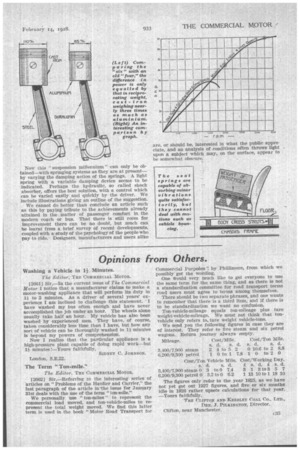Opinions from Others.
Page 57

If you've noticed an error in this article please click here to report it so we can fix it.
Washing a Vehicle in l Minutes.
The Editor, THE COMMERCIAL MOTOR.
[2661] Sir,—In the current issue of The Commercial Motor I notice that a manufacturer claims to make a motor-washing appliance that will perform its duty in 14 to 3 minutes. As a driver of several years' experience I am inclined to challenge this statement. -I have washed my bus often enough and have never accomplished the job under an hour. The wheels alone usually take half an hour. My vehicle has also been washed by experienced men. They have, of course, taken considerably less time than I have, but how any sort of vehicle can be thoroughly washed in 14 minutes Is beyond my powers of comprehension.
Now I realize that the particular appliance is a high-pressure plant capable of doing rapid work—but 14 minutes !—Yours faithfully,
SIDNEY C. JOHNSON.
London, S.E.22.
The Term "Ton-mile."
The Editor, TEE COMMERCIAL MOTOR.
[2662] Sir,—Referring to the Interesting series of articles on "Problems of the Haulier and Carrier," the last paragraph of the article in the issue for January 31st deals with the use of the term "ton-mile."
We personally use " ton-miles " to represent the commercial load moved, and ton-vehicle-miles to represent the total weight moved. We find this latter term is used in the book "Motor Road Transport for Commercial Purpaes by Phillimore, from which we possibly got the wording.
One Would very much like to get everyone to use the same term for the same thing, and as there is not a standardization committee for road transport terms road users must agree to terms among themselves.
There should be two separate phrases, and one wants to remember that there is a third item, and if there is to be standardization we want no confusion.
Ton-vehicle-mileage equals ton-mileage plus tare weight-vehicle-mileage. We must not think that tonvehicle only refers to.. tare weight vehicle-tons.
We send you the following figures in case they are of interest. They refer to five steam and six petrol wagons. Return journey always empty.
Mileage. Cost/Mile. Cost/Ton Mile.
s. d. s. d. S. d. s. d.
2,400/7,900 steam 2 4 to 5 2 0 10.6 to 2 8.8 6,200/9,300 petrol 1 0 to 1 7.8 1 0 to 2 0 Cost/Ton Vehicle Mile. Cost/Working Day.
s. d. s. d. I s. d. s. d.
3,400/7,900 steam 0 3 to 0 7.4 3 1 3 to 3 5 7 6,200/9,300 petrol 0 3.2 to 0 6.2 1 13 10 to 1 18 10
The figures only refer to the year 1925, as we have not yet got out 1927 figures, and five or six months idle in 1926 rather upsets calculations for that year. —Yours faithfully,
THE CLIFTON ANT) KERBLEY COAL CO., LTD., DEN. J. PILKINGTON, Director. Clifton, near Manchester.












































































































